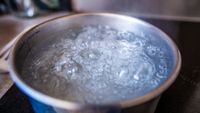Distilled Water vs Boiled Water**
Water is one of the essential elements for all known forms of life, and its properties are well established through scientific research. Two forms of water, distilled water and boiled water, are commonly consumed and have distinct characteristics that distinguish them from each other. This article aims to delve into the differences between these two water types, focusing on their preparation, properties, and uses.
Preparation
To prepare distilled water, a process often involving a machine known as a distiller, water is heated until it reaches boiling point and then allowed to vaporize. This vapor is then collected and condensed back into a liquid state. Boiled water, on the other hand, is produced by simply heating water to its boiling point in a pot or kettle. While both processes heat water significantly, the method of heating and the results are quite different between the two.
Properties
Both distilled and boiled water start off as tap water, which has typically been disinfected and filtered to remove impurities and bacteria. Upon heating, both types of water display varying levels of cleanliness and purity. However, it is important to note that boiled water typically has higher mineral concentrations than distilled water due to the partial evaporation of water that contains essential minerals.
Physical Characteristics
At standard temperature and pressure, the physical appearance of water is nearly indistinguishable. However, at higher temperatures, the differences between boiled and distilled water become more apparent. Boiled water may appear murkier or cloudier due to the formation of particulate matter that arises from the boiling process. This can be particularly evident when preparing beverages like tea or coffee that rely on the clarity of the water to achieve the intended taste. Distilled water, being a purer form of water, tends to be clearer and should flow freely without any suspended particles.
Chemical Characteristics
Chemically, the primary distinction between boiled and distilled water lies in the removal of various trace elements and contaminants. Distilled water is produced through a process known as distillation, which involves heating tap water and collecting the evolving vapor, allowing it to cool and condense into a liquid without any substances that could act as impurities.
Boiled water, however, is not subjected to rigorous distillation procedures. As a result, it may contain traces of minerals and other impurities that can serve various health benefits. In fact, certain cultures have used boiled water for culinary purposes for thousands of years, without noticeable adverse effects. While boiling water typically results in a more consistent and palatable quality of water, it does not offer the same high level of cleanliness and purity as distilled water.
Uses
The most prominent use of distilled water is for medical and laboratory purposes, where the highest level of purity is paramount. It is commonly used to dilute other liquids, such as antacids, and to wash delicate instruments. Distilled water can also be used to make ice and to clean surfaces due to its ability to effectively adsorb contaminants.
Boiled water, conversely, is generally used for everyday tasks such as cooking, cleaning, and personal hygiene. It is also frequently used as a base for making teas and other beverages, although it may lack the subtle flavors that can be achieved with finer-quality water. Furthermore, boiled water could be considered the safer option for consumption due to its familiarity to humans, regardless of its level of purity.
health impacts
When consumed in appropriate amounts, both boiled and distilled water are generally considered safe for most individuals. However, due to its lack of mineral content, distilled water may not provide the same health benefits as water that has been properly diluted. Many experts recommend incorporating a variety of foods and supplements into their diet to ensure adequate intake of essential minerals. As a result, while boiled water may be a suitable alternative for maintaining proper hydration, distilled water is generally not recommended as a primary water source for extended periods of time.
conclusion
Ultimately, the decision to use boiled or distilled water depends on personal preferences, cultural practices, health considerations, and specific needs. No matter which type of water is chosen, it is important to ensure that it is sourced from a reliable and uncontaminated source to minimize the risk of harmful health effects.







